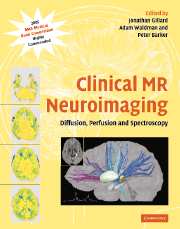Book contents
- Frontmatter
- Contents
- List of case studies
- List of contributors
- List of abbreviations
- Foreword
- Introduction
- SECTION 1 PHYSIOLOGICAL MR TECHNIQUES
- SECTION 2 CEREBROVASCULAR DISEASE
- SECTION 3 ADULT NEOPLASIA
- SECTION 4 INFECTION, INFLAMMATION AND DEMYELINATION
- 22 Physiological imaging in infection, inflammation and demyelination: overview
- 23 MR spectroscopy in intracranial infection
- 24 The role of diffusion-weighted imaging in intracranial infection
- 25 MR spectroscopy in demyelination and inflammation
- 26 Diffusion imaging in demyelination and inflammation
- 27 Physiological MR to evaluate HIV-associated brain disorders
- SECTION 5 SEIZURE DISORDERS
- SECTION 6 PSYCHIATRIC AND NEURODEGENERATIVE DISEASES
- SECTION 7 TRAUMA
- SECTION 8 PEDIATRICS
- Index
22 - Physiological imaging in infection, inflammation and demyelination: overview
from SECTION 4 - INFECTION, INFLAMMATION AND DEMYELINATION
Published online by Cambridge University Press: 07 December 2009
- Frontmatter
- Contents
- List of case studies
- List of contributors
- List of abbreviations
- Foreword
- Introduction
- SECTION 1 PHYSIOLOGICAL MR TECHNIQUES
- SECTION 2 CEREBROVASCULAR DISEASE
- SECTION 3 ADULT NEOPLASIA
- SECTION 4 INFECTION, INFLAMMATION AND DEMYELINATION
- 22 Physiological imaging in infection, inflammation and demyelination: overview
- 23 MR spectroscopy in intracranial infection
- 24 The role of diffusion-weighted imaging in intracranial infection
- 25 MR spectroscopy in demyelination and inflammation
- 26 Diffusion imaging in demyelination and inflammation
- 27 Physiological MR to evaluate HIV-associated brain disorders
- SECTION 5 SEIZURE DISORDERS
- SECTION 6 PSYCHIATRIC AND NEURODEGENERATIVE DISEASES
- SECTION 7 TRAUMA
- SECTION 8 PEDIATRICS
- Index
Summary
Introduction
This chapter will offer an overview of physiological imaging of infectious inflammatory and demyelinating diseases. It will describe routine imaging findings and the current and potential roles of a variety of techniques. Subsequent chapters will provide more detailed information of specific techniques as they apply to a variety of disease processes.
MR imaging (MRI) has had a profound effect on detection, management and outcome of central nervous system (CNS) infectious, inflammatory and demyelinating diseases. While this statement seems to apply uniformly to virtually all CNS disorders, there is a difference. Despite recent therapeutic advances, outcomes for many disorders (e.g. stroke, neoplasm and neurodegenerative diseases) have improved only modestly because effective treatments are not yet available. In these disorders, the MRI tools discussed in this book will play an important role in developing and monitoring new therapies. In infectious and inflammatory diseases, effective treatments are available for many disorders but success is dependent upon early institution of the correct therapeutic regimen. MR has led to a dramatic improvement in outcome by allowing for early and accurate detection of many of these disorders. The presence of characteristic MRI features often allow for accurate diagnosis, at least in the hands of experienced neuroradiologists. In these disorders, physiological techniques such as diffusion weighted imaging (DWI) (Tsuchiya et al., 1999), diffusion tensor imaging (DTI) (Ulug et al., 1999), perfusion weighted imaging (PWI) and MR spectroscopy (MRS) (Barker et al., 1995; Cecil and Kenkinski, 1998) are useful additions to “routine” MR since they may allow for earlier detection (e.g. DWI in herpes simplex type I (HSV1) encephalitis – HSV1 (Sener, 2001)) or more accurate characterization of lesions (e.g. DWI (Ebisu et al., 1996) and MRS in brain abscesses (Remy et al., 1995; Kim et al., 1998)).
- Type
- Chapter
- Information
- Clinical MR NeuroimagingDiffusion, Perfusion and Spectroscopy, pp. 353 - 379Publisher: Cambridge University PressPrint publication year: 2004



